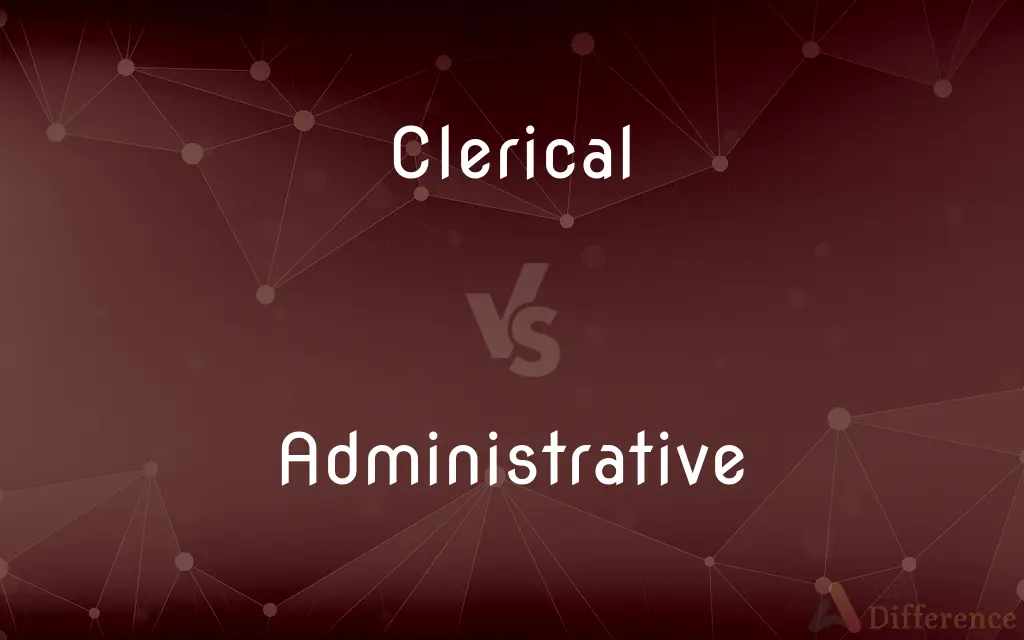Clerical vs. Administrative — What's the Difference?
Edited by Tayyaba Rehman — By Urooj Arif — Updated on March 20, 2024
Clerical work involves routine office tasks, focusing on daily operational support, whereas administrative tasks are broader, involving decision-making and policy implementation.

Difference Between Clerical and Administrative
Table of Contents
ADVERTISEMENT
Key Differences
Clerical tasks are primarily focused on day-to-day office operations such as data entry, filing, and managing records. These tasks are essential for maintaining the smooth running of office systems. On the other hand, administrative duties encompass a wider range of responsibilities that include managing office budgets, planning and executing office policies, and sometimes overseeing clerical staff.
While clerical roles are often entry-level positions requiring specific skill sets like typing, organization, and basic computer knowledge, administrative positions typically demand a higher level of expertise, including managerial skills, decision-making capabilities, and often a deeper understanding of the business or organization's operations.
Clerical workers usually support the administrative staff, ensuring that all the paperwork and data management necessary for the office to function are handled efficiently. Whereas, administrative professionals work on a strategic level, focusing on the optimization of office procedures and the implementation of changes to improve office operations.
In terms of career progression, clerical positions often serve as a stepping stone to more advanced administrative roles. Administrative roles, by contrast, can lead to higher managerial positions within an organization, offering a pathway to more significant leadership responsibilities.
Despite the differences, both clerical and administrative roles are crucial for the effective operation of any office. Clerical tasks ensure the day-to-day details are taken care of, while administrative tasks focus on the overall management and efficiency of the office.
ADVERTISEMENT
Comparison Chart
Focus
Routine office tasks
Broader office management and decision-making
Skills Required
Typing, filing, basic computer skills
Managerial skills, strategic planning
Career Progression
Stepping stone to administrative roles
Leads to higher managerial positions
Responsibilities
Data entry, managing records, filing
Overseeing clerical staff, budget management, policy implementation
Level of Expertise
Entry-level, task-specific
Higher level, involves oversight
Compare with Definitions
Clerical
Relating to clerks or office workers.
The clerical staff organized the documents for the meeting.
Administrative
Pertaining to decision-making and policy implementation.
The administrative decisions shaped the company's direction.
Clerical
Pertaining to office work, especially routine documentation and administrative tasks.
She secured her first job performing clerical duties at a local law firm.
Administrative
Related to the tasks of an administrator.
She excelled in her administrative tasks, improving office efficiency.
Clerical
Involving the handling of correspondence and record-keeping.
His clerical skills were an asset to the office.
Administrative
Of or relating to the running of a business, organization, etc.
He was promoted to an administrative role where he managed the team's operations.
Clerical
Characterized by detailed attention to paperwork.
The job requires clerical accuracy and speed.
Administrative
Concerning the organization and coordination of tasks.
His job involved significant administrative coordination among departments.
Clerical
Of or relating to a clerk's position or work.
She was looking for a clerical position that offered more responsibilities.
Administrative
Involving the management of an office's affairs.
Her administrative duties included overseeing the budget and resources.
Clerical
Of or relating to clerks or office workers or their work.
Administrative
The act or process of administering, especially the management of a government or large institution.
Clerical
Of, relating to, or characteristic of the clergy.
Administrative
The activity of a government or state in the exercise of its powers and duties.
Clerical
Advocating clericalism.
Administrative
The executive branch of a government.
Clerical
A member of the clergy.
Administrative
The group of people who manage or direct an institution, especially a school or college.
Clerical
Clericals Garments worn by the clergy.
Administrative
The term of office of an executive officer or body.
Clerical
An advocate of clericalism.
Administrative
(Law) Management of a trust or estate.
Clerical
Of or relating to clerks or their work.
Administrative
The dispensing, applying, or tendering of something, such as an oath, a sacrament, or medicine.
Clerical
Of or relating to the clergy.
Administrative
Of or relating to administering or administration.
Clerical
A member of the clergy.
Administrative
Pertaining to administration; administering; executive; as, an administrative body, ability, or energy.
Clerical
Clerical garments.
Administrative
Of or relating to or responsible for administration
Clerical
Of or pertaining to the clergy; suitable for the clergy.
Clerical
Of or relating to a clerk or copyist, or to writing.
Clerical
Characteristic of the work performed by a clerk, secretary, or copyist, or suitable to be performed by a clerk.
Clerical
Of or relating to clerks;
Clerical work
Clerical
Of or relating to the clergy;
Clerical collar
Clerical
Appropriate for or engaged in office work;
Clerical skills
A clerical job
The clerical staff
Common Curiosities
What distinguishes administrative work from clerical work?
Administrative work involves broader management tasks, including decision-making and policy implementation, unlike the routine nature of clerical tasks.
What are clerical tasks?
Clerical tasks include routine office duties such as filing, data entry, and managing records.
How do clerical workers support administrative staff?
Clerical workers support administrative staff by handling the essential day-to-day tasks that keep office systems running smoothly.
Do clerical roles require specialized skills?
Yes, clerical roles typically require specific skills such as typing, organization, and basic computer proficiency.
What are the key responsibilities of administrative professionals?
Key responsibilities include managing office budgets, overseeing clerical staff, and implementing office policies.
What educational background is typically required for administrative roles?
Administrative roles often require a higher level of education, sometimes including degrees in business administration or relevant fields.
Can a clerical position lead to an administrative role?
Yes, clerical positions often serve as a stepping stone to more advanced administrative roles within an organization.
Are administrative roles considered higher than clerical roles?
Yes, administrative roles are generally considered higher due to their broader scope of responsibilities and decision-making authority.
How does the work environment differ between clerical and administrative roles?
The work environment for clerical roles is often more task-oriented and routine, while administrative roles may involve a broader range of activities and greater autonomy.
What skills are essential for administrative professionals?
Essential skills include managerial abilities, strategic planning, and a thorough understanding of the organization's operations.
Why are administrative roles crucial in an organization?
Administrative roles are crucial because they involve strategic management and decision-making that direct the organization's overall operations.
What impact do administrative decisions have on an organization?
Administrative decisions can significantly impact an organization's direction, efficiency, and overall success.
Is experience in clerical work beneficial for administrative positions?
Yes, experience in clerical work can provide a solid foundation for understanding office operations, beneficial for administrative positions.
Can administrative duties vary depending on the organization?
Yes, administrative duties can vary widely depending on the organization's size, industry, and specific operational needs.
What career progression opportunities are available for clerical workers?
Clerical workers can progress to administrative roles, offering a pathway to managerial positions within the organization.
Share Your Discovery

Previous Comparison
Devotion vs. Loyalty
Next Comparison
Casual vs. InformalAuthor Spotlight
Written by
Urooj ArifUrooj is a skilled content writer at Ask Difference, known for her exceptional ability to simplify complex topics into engaging and informative content. With a passion for research and a flair for clear, concise writing, she consistently delivers articles that resonate with our diverse audience.
Edited by
Tayyaba RehmanTayyaba Rehman is a distinguished writer, currently serving as a primary contributor to askdifference.com. As a researcher in semantics and etymology, Tayyaba's passion for the complexity of languages and their distinctions has found a perfect home on the platform. Tayyaba delves into the intricacies of language, distinguishing between commonly confused words and phrases, thereby providing clarity for readers worldwide.














































